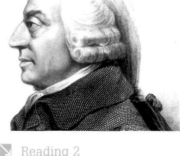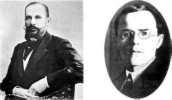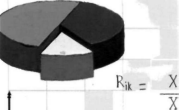ВУЗ: Не указан
Категория: Не указан
Дисциплина: Не указана
Добавлен: 18.10.2024
Просмотров: 244
Скачиваний: 1
Sand and limestone are the
needed to make glass.
The to make a car involves many
people and machines
The extra money a company makes is called
People want from the products
they buy.
is when there is very little
of something.
is when there is lots of something.
Gold and silver are examples of
Another word for idea is
The is the number oi people a
country has.
6
H* . • J • ' f . . n »
. ■ t

History of economic thought
Economic thought g<ies hack thousands of years. The ancient (ireek, Xcnophon. used the word iiikownniknn(from oikos. mcaiung,'fmu7v.household, estate,and nomos. for чтиц. lain.lit. was talking about skilful or clever ways to manage land and households. We could call main of Aristotle's political writings economic*although he diil not list (he won! The English word economies first appeared in the P'tii century - two and a halt thousand years after Xenophon
Early economic (bought was .ill about the meaning of wealth or being rich These early thinkers asked, 'what makes a stale or :» с .mm wealthy':' For nearly 2,<нюyears, the answer was very simple- gold. A country or nation's wealth depended on its owning precious met.ils This simple view of the economy remained tint medieval limes.
\
to make the state strong. For them, the nation's wealth depended on stocks of gold and the size of the population. More people meant bigger armies and a stronger state.
These were still simple ideas. However, daily experience had also taught people many basic economic concepts. For example, they understood the importance of trade with other states. They realised that scarcity makes things more expensive and abundance makes them cheaper.
Modern economics was really born in the 19th century. At this time, thinkers like Adam Smith wrote down ideas that are still important today. Adam Smith is often called the Father of Modern Economics,although the science was calledpolitical economythen. Smith realised that a nation's wealth depended on its ability to produce goods. The value of these goods depended on the cost of production. The cost of production depended on the cost of workers, raw materials and land. This was really the first example of macroeconomics.
Smith and other classical economists were writing at a time of great change. The industrial revolution had begun. Paper money began to replace precious metals. The middle classes were growing stronger. Economists' theories echoed these changes. They wrote about the division of labour (each worker taking their part in the production process). They discussed the problems of population growth. They influenced thinking about social classes.
For classical economists, the value of goods depends on the cost of production. However, the price of goods is not always the same as their real cost. Later economists developed new theories to explain this weaknessin classical economies. These are known as the neoclassicaleconomists and they were writing at the end of the 19th and early 20th centuries.
In neoclassical economics, supply and demand make the economy work. In other words, the price of goods depends on how much people want them and how easily they can be found. Consumers want satisfaction from their resources (time and money). Firms want profit. In neoclassical economics, this is the basic relationship in the economy. These ideas are still the basis of economic thinking today.
И E Comprehension
Now read the text again and decide whether these statements are true or false.
Aristotle did not use the word economics,but he did write about
economic ideas. T □ / F П
Early economists thought that a
nation without gold was poor. T П / F П
People in medieval times didn't understand anything about
economics. T □ / F D
In classical economics, the value of something was measured in gold. T П / F D
Economists later found a problem
with the classicalmodel. T □ / F □
In neoclassical economics, supply
and demand control price. T D/ F □
Before you listen
Look at this fact file about Adam Smith. Can you fill in any of the information?
Born in Scotland in (1)
Lost his father at the age of (2)
Kidnapped at the age ol (3)
Went to University of Glasgow at the age of
)
Went to Oxford University at the age of
)
Most famous book is The Wealth of
)
Influenced Karl Marx and the founding fathers of
Macmillan Guide to Economics
Unit I
7
H F Listening Ц)))
Now listen and complete the information about Adam Smith's life.
G Speaking
Discuss these questions with your partner.
What use is the study oi economics?
What trade-offs do you make every day?
How do the decisions we make affect the rest of the world?
Task
Give a two-minute talk on the history of economic thought.
First, read text 2 again and make notes below on the following.
' early economic thinking • the classical economists neoclassical economics
Notes:
In this unit you learnt about Adam Smith, a famous thinker' from Scotland. Who are th»-' most famous 'thinkers' from your country?
Work with a partner and decide which Russian thinkers have been most influential. Choose from the following: Kondratyev. Leontyev. Stolypin, Lenin.
Magazine article
Write a magazine article about one famous thinker from Russian history. Use the guide to help you organise your article.
TITLE:
PARAGRAPH 1
Who is this thinker and what are they best known for?
PARAGRAPH 2
Biographical information: when and whew bom family bio important points m hie.
PARAGRAPH 3
What was his her message?
What were his her influential thoughts?
PARAGRAPH 4
Why do you think this person is important?
Write 100-150 words
Pronunciation guide
Convenience>,.-ni:;ii;nis
Data '.)<•:!•>
Society
Stolypin
Kondratyev
Lenin
Leontyev
8
Kt. II 6u!l)t К fr^n^md Uxl 1

Before
you read
Discuss
the following with your partner.
Econometrics
is a term that economists use. -* Look at the word:
eco.no + metrics What
do you think it means?

A Vocabulary
from
one year to
Prices usually the next.
People work in order to money.
My grandmother's only is
her pension.
Einstein is famous for his of relativity.
The police search for to
help them find the criminal.
If you blue with red you
get purple.
Government show that
crime is rising
People their money in
bank accounts.
Уои can use a ruler to the siso
of things.
A person's is the money they
earn each month from work,
llis of the problem is very good.
In experiments, scientists try to find out what makes change.
An expert in a subject who works and teaches at a university :s known as an
Econometrics
Economists like to tnaki theories. Tlicy theorise afxiut why inflation happens, for exampk . or what causes unemployment. lint theories are 1101 useful il you cannot test thern. This is true lor all sciences, ami the same for economies
I'o test a theory, you Inst need to «и Ik t what scientists call i in)tinea!evidence. That's evidence that can he measured, like money spent 01 babies born. When you have collected the evidence, you're ready to do the maths and statistics to test your theory. Economists call their maths i conotiictrics.
>
1 9
<
Г I jf TO F < С, r,,
amount someone saves = their income x their happiness to save
Of course, we can't measure happiness to save exactly, but with econometric mathematics we can give it a value. Then we can see how that value differs between groups of people or cultures. Econometrics is about finding relationships between variables - in other words relationships between values that change. Economists try to find out if variable A changes every time value В changes. They want to find out if variable A is dependent on variable B. This is called analysis, and there are two main kinds of econometric analysis: rime-series analysis and cross-sectional analysis.
Time-series analysis shows how variables change over a period of time. How salaries increased over the last century, for example. Gross-sectional analysis compares variables at one point in time. The salaries of men compared to women right now, for example. Of course, economists like to make things more complicated than that. Sometimes they combine cross-sectional with time-series analysis, and this is called panel data analysis.
10 Macmillan Guide lo
Economics Unit 1
И В Comprehension
Now read the text again and choose the best answer А, В or С to complete each sentence.
Econometrics is ...
A the maths that economists use. В away to measure how much someone saves.С aformula to find out why peoplesave.
panel data analysis ...
A only shows differences over time. В only shows differences between groups. С shows differences between groups and changes over time.
Econometrics is ...
A only good for proving theories. В good for making practical economic
decisions. С only good for academic work.
Before you listen
Discuss the following with your partner.
The table below is an example of econometric data.
What does the table show?
Is this time-series analysis or cross-sectional
analysis?
И
С Listening 4)))
Weekly spending by children aged seven to fifteen in the UK
Before you read 13
What does economics study? 17
What are 18
microeconomics and macroeconomics ? 18
Before you listen 20
Before you read 22
History of economic thought 23
Before you listen 26
Before you read 27
Econometrics 28
Before you listen 29
Before you read 35
The law of demand 35
Before you listen 36
Unit 41
Before you read 41
The traditional economy 41
Before you listen 42
Before you read 44
The market economy 44
Before you listen 45
The planned economy 47
Before you listen 52
Before you read 53
Before you listen 56
Revision Vocabulary Units 1 to 4 58
Before you read 60
Consumer choices 62
Before you listen 72
Before you read 74
Costs and supply 74
Before you listen 75
Unit 77
Before you read 77
Market structure and competition 77
Before you listen 78
Before you read 79
Monopolies 79
Unit 84
Before you read 84
The labour market 84
Before you listen 85
Before you read 86
Supply of labour 86
Before you listen 88
44Unit 90
45Before you read 90
70Factors of production 90
85Before you listen 92
Before you read 93
Division of labour 93
Before you listen 94
Revision Vocabulary Units 5 to 8 97
Before you read 97
Surplus 98
Before you listen 99
Before you read 101
Price discrimination 101
Before you listen 102
Welfare economics 104
Before you listen 105
Before you read 106
Government revenue and spending 106
Before you listen 107
Before you read 109
Wealth, income and inequality 110
Before you listen 112
Before you read 113
Poverty 114
Before you listen 118
Macroeconomics 121
Before you listen 122
Before you read 123
ф D Vocabulary 123
Aggregate demand and aggregate supply 123
BP E Comprehension 125
Before you listen 125
0 F Listening *))) 125
ff G Speaking 126
Task 126
Revision Vocabulary Units 9 to 12 128
Unit 129
Before you read 129
Money 129
^ В Comprehension 130
Before you listen 130
В с Listening Ц))) 130
Before you read 130
0 D Vocabulary 131
Banks 142
В E Comprehension 143
Before you listen 143
F Listening Ц))) 143
G Speaking 144
Unit 145
Before you read 145
ff A Vocabulary 145
Fiscal policy 145
P В Comprehension 146
Before you listen 146
С Listening 4))) 146
Before you read 147
0 D Vocabulary 147
Monetary policy 147
Before you listen 150
rehension 150
Before you read 153
A Vocabulary 153
Interest rates and the money market 153
В Comprehension 154
С Listening H))) 155
Before you read 156
fiJ D Vocabulary 156
Economic shocks 156
Before you listen 159
G Speaking 160
Before you read 161
fif A Vocabulary 161
Inflation 161
Before you listen 163
Before you read 165
ff D Vocabulary 165
Unemployment 165
Before you listen 166
F Listening H))) 166
E Comprehension 166
G Speaking 166
9 H Writing 167
Revision Vocabulary Units 13 to 16 168
Unit 169
Before you read 169
Economic growth 170
9 В Comprehension 172
Before you listen 172
ff С Listening Ц))) 173
Before you read 173
ff D Vocabulary 173
The business cycle 174
fi? E Comprehension 175
Before you listen 175
F Listening И))) 176
H Writing 176
Before you read 177
f A Vocabulary 177
The open economy 177
? В Comprehension 178
Before you listen 179
С Listening 4))) 180
Before you read 180
BP D Vocabulary 180
Exchange rates 181
0 E Comprehension 183
Before you listen 183
F Listening H))) 184
G Speaking 185
Task 185
Before you read 186
A Vocabulary 186
Exchange rate mechanisms 186
й В Comprehension 187
Before you listen 187
0 С Listening 4))) 187
Before you read 188
9 D Vocabulary 188
International trade 188
Before you listen 189
В F Listening 4))) 189
G Speaking 190
Task 190
Unit 191
Before you read 191
В A Vocabulary 191
Less developed countries 192
в В Comprehension 193
Before you listen 193
0 С Listening *))) 193
Before you read 193
В D Vocabulary 193
The Russian economy in the 19th century 194
fij E Comprehension 195
Before you listen 195
F Listening 4))) 195
Task 197
H Writing 197
A Vocabulary 197
в? В Comprehension 199
Before you listen 199
0 С Listening 4))) 199
Before you read 199
ff D Vocabulary 199
Russia's foreign trade 200
9 E Comprehension 201
Before you listen 201
Revision Vocabulary Units 17 to 21 203
games and hobbies: £0.90 £ (5)
Now listen to somebody talking about a survey of young people's spending habits. Fill in the gaps in the table.
Before you read
Discuss these questions with your partner.
Why do you think gold is expensive?
-> What might bo the reason that so many electrical goods are quite cheap now?
ff D Vocabulary
Complete each sentence with a word from the box.
applies available confusing curve demand exception impressive increase law limited set shift taxes

The law of demand
Economics can often Ы* very confusing Econometric formulas ami impressm charts an sonu nines impossible to underst.uid I hanktully though, some economic ideas are coinpk tely obvious i >ne ol tluse ideas is the Uric m <Linut\ii Economists ire alway s disagreeing with each "flier, but thi law of demand is the only ilium they ill agree on. They ill agree on ii because it makes sense even to non-economists like you and iik
Demand is how much of the same good n service pcopk would like (" buy. Tile law ol ik maud says that demand for something falls .is its price risis. Economists show this concept with the th nuuul сш-:\ which you can see in figure 1 on page 12
Flu- reason why the law of demand works is quite obvious: the money we have is limited If something becomes more expensive,we will bave less money available to spend on our other in . .is If'the product or service is not a necessity we will decide to buy less of it
Most rules liavt exceptions, hut economists agrei that there are very lew exceptions t. the law of demand. U even applies t.. basic necessities liki waler. When wall i becomes more ex|4'iisivi . people find ways to use lessWhen tile govcrnmeni put higher taxes on petrol, people try not to ust their ears so often. The fall in demand might be very small, but il is real.
COFFEE
SHOP
So price has ail el't'eet on demand, hut the strength ot' the effect varies The strength of the price / demand relationship is called pricc elasticity. Economists use a simple econometric formula to measure price elasticity for a certain product in a particular market. This helps governments and companies set prices at the correct level for a particular time and plan price increases.